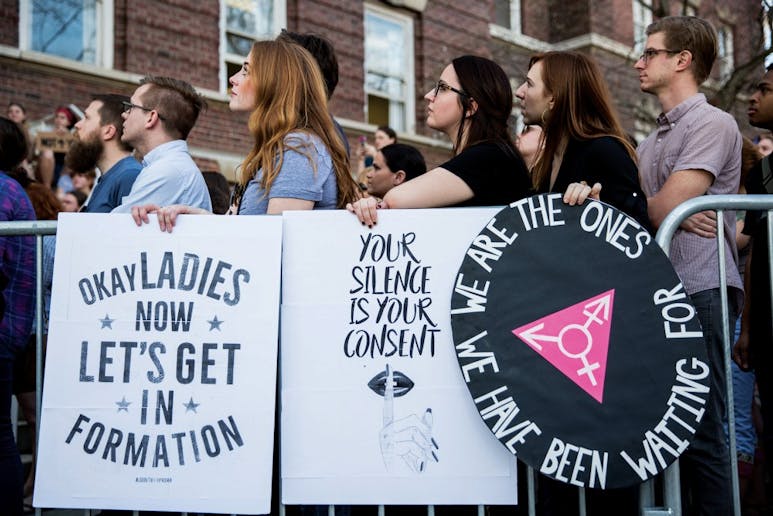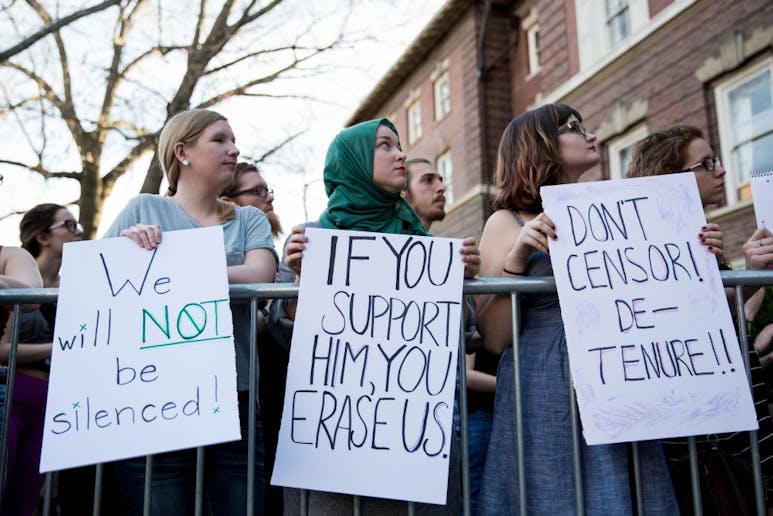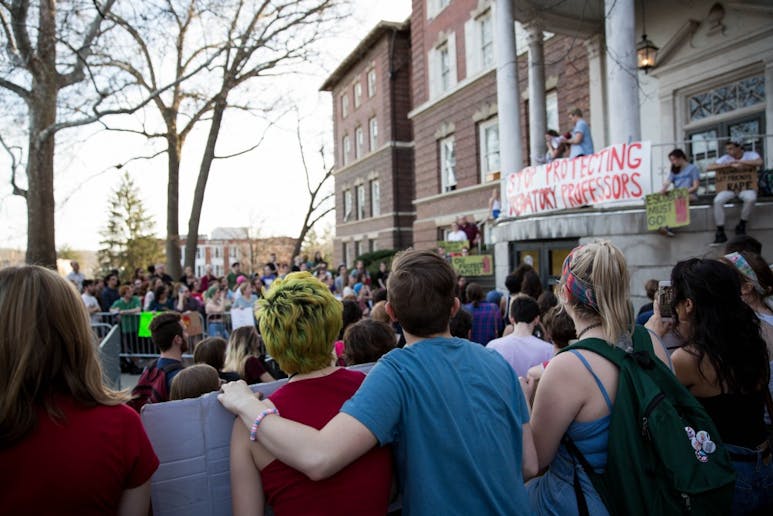They sat in the Title IX office on a long wooden bench, like they were already in court.
It was March 2016, and Susanna Hempstead and Christine Adams had come to Ohio University’s Office of Equity and Civil Rights Compliance to file a sexual harassment complaint against then-English professor Andrew Escobedo. The room was filled with five dying plants.
Hempstead texted the man she was dating: “All the plants in the Title IX office are dying.”
“It was just the most metaphorical embodiment of what the next years of our life would be like,” Adams said. “We had no idea what was going to happen at all.”
Ohio University announced its $670,000 settlement with the two English graduate students Wednesday. The women argued in federal court that OU had remained deliberately indifferent to reports that Escobedo sexually harassed women in the English department for more than a decade, thereby violating their rights to equal access to education.
Adams and Hempstead reported that on the night of Dec. 3, 2015, Escobedo bought them drinks at an end-of-the semester party for the English class he was teaching, then touched them sexually without consent. At the time, final grades for the course had not been submitted. Escobedo denied the allegations and has never been charged criminally.
The university’s nearly yearlong investigation found that incident was more likely than not part of a pattern of behavior in which Escobedo touched female students and faculty without consent while socializing with them at bars. Six women reported harassment to ECRC, and the office found enough evidence to substantiate four of the reports. The earliest incident reportedly occurred in 2003.
Adams and Hempstead filed their suit against OU, Escobedo and English professor and former English department chair Joseph McLaughlin in March 2017. They argued that the university did not investigate a 2006 sexual harassment report that OU has no copy of. Adams and Hempstead argued that McLaughlin was aware of Escobedo’s conduct but did not take action because the two were friends.
McLaughlin declined to comment on this article, and OU Spokeswoman Carly Leatherwood said the university also would not comment. In court filings, the university maintained that it took appropriate responses to all complaints it received.
Between the Title IX complaint and the lawsuit, Adams and Hempstead have spent the majority of their careers at OU locked in a fight both for and against the institution they study and teach at. They fought against an administration they believe allowed a sexual predator to flourish for more than a decade. They fought for their students, colleagues and other survivors of sexual violence, they said.
In the process, they said they relived trauma, were denied access to university resources and faced retaliation. And under the new rules proposed by U.S. Secretary of Education Betsy DeVos, they said none of their success may have been possible at all.
The third job
Walking into Attorney Mike Fradin’s office in early 2017 was like stepping into reality, Hempstead said.
She and Adams met with Fradin, an attorney based in Athens and Chicago, to discuss ECRC’s findings. In that meeting, Fradin condemned the university’s response in a way Adams and Hempstead hadn’t heard before. They both agreed then to file a civil rights complaint against OU.
“I walked out of that meeting onto Court Street and we were dead in between Jackie O's and Tony's, which is where our assaults happened, and I just was shaking because I couldn't believe that we were actually going to do it,” Adams said. “It seemed impossible.”
Adams and Hempstead had heard from professors being a graduate student involved two jobs: teaching and learning. They quickly felt they had taken on a third job. On weekends, early in the mornings and late at night, they called potential witnesses and drafted lengthy legal documents. They estimated they sometimes spent between 20 and 40 hours a week working on the lawsuit.
They interviewed witnesses themselves because the witnesses, often reportedly victims of Escobedo themselves, might have felt more comfortable speaking to Adams and Hempstead than Fradin. When Adams and Hempstead couldn’t get enough work done during the week, they would spend entire weekends together — “sleepovers,” they called them.
Hempstead began taking photos when they worked on the case. In an album of her phone titled “Title IX,” she has more than 100 pictures.

Christine Adams, left, and Susanna Hempstead, center, listen to a speaker during a rally outside of Ellis Hall on Feb. 24, 2017. The rally was held in response to the university's treatment of the sexual harassment allegations against English professor Andrew Escobedo. (FILE)
One breakthrough happened in the parking lot of The Village Bakery at 9 or 10 one night, when Adams and Hempstead called a former adjunct professor. That former professor said she reported in 2006 that Escobedo had touched her without consent, but the university had done nothing.
Adams took notes in the passenger seat as Hempstead talked. When they got off the phone, Adams and Hempstead both started screaming.
“I don't even know why we were screaming,” Adams said. “Was it rage? Was it vindication? I don't know. I think we couldn't believe that it was real, because we knew the whole time … (that the university) should have done something about this years and years and years ago, but we couldn't believe how obvious it was.”
The legal process meant reliving traumatic experiences and taking great care in their appearances and mannerisms. The two attended three mediation sessions, the events of which are confidential. Each lasted up to eight hours.
Adams and Hempstead chose their outfits carefully: nothing too revealing, but nothing too conservative. They feared that if they were too emotional, they might lose credibility. If they showed too little emotion, they worried people would believe the incidents had no impact.
It was difficult to square their ideas of justice with the slow, objective, sometimes cold legal process. Hempstead struggled more than Adams. Escobedo eventually resigned from his job in November 2017, but the slow speed of the process was hard to take.
“If someone perpetuates misconduct and sexual violence for over 10 years through their position of authority, they should lose that job,” Hempstead said. “They should be fired. So when that didn't happen, I think that was probably the biggest blow that I experienced.”
A divided department
Escobedo’s office was directly across from Hempstead’s and two doors down from Adams’.
By the time she and Hempstead filed the complaint, Adams had already begun holding her office hours at Donkey Coffee to avoid encountering him, even though it caused a “slew” of problems. She had no access to a printer at Donkey and couldn’t scan documents.
Hempstead had spent plenty of time in Ellis Hall but stopped after she filed the report.
“In my mind, already everyone knew,” Hempstead said. “I just would scurry into my office, down to teach and then gone, because it just felt immediately like the spotlight was on us, even though I think that was not true for many months.”
A year later, faculty members received a copy of ECRC’s memorandum of findings, a 78-page document with explicit accounts of the night of Dec. 3, 2015. The allegations against Escobedo divided the department.
A committee of tenured English faculty members voted on whether Escobedo should be detenured and fired in February 2017. According to a report from that meeting, some faculty members believed he should undergo treatment for his alcohol dependence and return to the department, while others believed he should be fired for his behavior. Fourteen faculty members voted for the dismissal process to proceed, eight voted against and two abstained.
“What would he have had to do for it to be a hundred percent?” Hempstead said. “For it to be unanimous? What would it have had to be?”

Protestors hold signs during a rally outside of Ellis Hall on Feb. 24, 2017. The rally was held in response to the university's treatment of the sexual harassment allegations against English professor Andrew Escobedo. (FILE)
Hempstead and Adams felt betrayed, especially because some of the people who voted in Escobedo’s favor considered themselves feminist scholars.
Some of the same faculty Adams and Hempstead came to OU to work with had taken Escobedo’s side. Adams and Hempstead both changed their specializations — Adams, who came to OU to study poetry, switched to creative nonfiction. Hempstead came to study modernist literature but now studies post-colonial literature. They switched specializations to avoid faculty who had made comments in favor of Escobedo.
“All I ever wanted was to take classes with these people and feel comfortable around these people and put them on my committee and talk about things that I care about, and I just watched my options wither,” Adams said.
They said they also saw retaliation against the graduate students who took their side. People were pulled aside and told to stop talking about the complaint, they said. Dissertation defenses and other interactions began to feel fraught for some students, as “comments became pointed and personal instead of scholarly and craft-based,” Hempstead said.
Adams said a professor once said to her in class, “You’re not afraid of me, but you should be.” The professor might argue it was meant as a joke, but Adams didn’t feel like it was.
During the legal process, the two also saw their resources decline in a more concrete way. Staff turned Adams away from Counseling and Psychological services in October 2017, citing her involvement in the suit against OU. The university offered to pay for Adams and Hempstead to see unaffiliated therapists, but for six months Adams and Hempstead were unable to find a local therapist willing to treat them.
Leatherwood said the university would not comment beyond the statement it released Wednesday.
“Ohio University would like to take this opportunity to reaffirm its commitment to respond to incidents of sexual assault, interpersonal violence and harassment,” the statement reads. “As the University moves forward, we will continue to challenge our campus community to help us strengthen our commitment to a sexual violence and harassment free campus.”
New rules
A certain combination of factors allowed Hempstead and Adams to succeed during the past three years. The first was their relationship with each other.
Hempstead left Tony’s Tavern the night of Dec. 3 because of Adams. Adams said she made eye contact with Hempstead across the bar and saw Escobedo’s hand between Hempstead’s legs — the same place he had touched Adams, she said — and she mouthed, “What the f--k.” That was when Hempstead decided to leave.
Had it not been for each other, they said they never would have been able to walk into Lindley Hall to file the initial complaint.
“I never could have done it alone. It would have broken me,” Adams said. “Here's the saddest part: I can think of no other case where two victims were sexually assaulted by the same person in the same night in full view of each other and their colleagues. ... My heart breaks for the number of victims that don't have a Susanna.”
They also had the support of other graduate students in their department. Though faculty members disagreed amongst themselves about Escobedo’s culpability, Hempstead and Adams said other graduate students backed them unanimously. They believe those people put their careers on the line to support them.

Demonstrators gather during a rally outside of Ellis Hall on Feb. 24, 2017. The rally was held in response to Ohio University's treatment of the sexual harassment allegations against English professor Andrew Escobedo. (FILE)
Finally, their case rested on Title IX guidelines that now are in limbo. Betsy DeVos announced Friday potential guidelines that reduce the liability of schools and increase protections for those accused of sexual misconduct.
Under the proposed guidelines, it’s less clear whether Escobedo would have been found responsible for sexual misconduct. DeVos’ proposed rules only hold schools accountable for conduct that occurs during school programs and activities, and Escobedo was accused primarily of sexually harassing faculty and students at bars.
The new rules would also allow for the accusers and the accused to cross-examine each other through representatives, which Hempstead said will make the experience more intimidating and difficult to navigate for survivors. She and Adams had no legal representation during the Title IX process, but she said Escobedo did.
“Already it’s such an intense, heartbreaking, traumatizing experience,” Hempstead said. “If you know that your school is not going to take care of you and is going to allow you to be cross-examined by the person who has sexually assaulted you, then you’re not going to walk into that office at all. Those offices are essentially going to be ghost towns.”
Hempstead has set reminders on her phone to speak out against the proposed rules during the 60-day comment period. More locally, she and Adams will serve on the OU Presidential Advisory Committee for Sexual Misconduct.
“I think that what a lot of people assume about me and Christine is because we sued the school that we hate the school,” Hempstead said. “But really, we’re fighting for the school to be a better place because we really care about the students and the life of that town. ... Even though now our investigation is over, even though the lawsuit is now over, we will still be a part of that conversation and making sure that people don’t experience the things that we experienced.”






